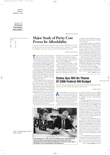It is hard to ignore the fattening of America—once again Americans seem to be paying heed to the credo that “bigger is better.” Statistics also confirm what the eyes can't miss. For example, the prevalence of obesity among American adults has risen about 50 percent each decade since 1980, so that today, two-thirds of adults are overweight or obese, epidemiologists reported in the March 17 New England Journal of Medicine. “These trends,” they wrote, “have affected all major racial and ethnic groups, all regions of the country, and all socioeconomic strata, with the largest increases in obesity occurring among children and minorities.”
Further, the Institute of Medicine reported earlier this year, “We begin the 21st century with a startling setback—an epidemic in childhood obesity... .Over the past three decades, its rate has more than doubled for preschool children. .and adolescents,. .and it has more than tripled for children ages 6 to 11 years.”
America's obesity epidemic can be blamed on numerous factors—a superabundance of fast-food restaurants serving gargantuan portions, too much time spent sedentary in front of computer screens and television sets, smoking cessation, and so forth. But what about psychological factors? There are no hard data, and scientists hold different opinions on the subject.
“My personal view is that neuropsychological factors are going to emerge as one of the important causes of obesity,” James Hudson, M.D., said in an interview. Hudson is an associate professor of psychiatry at Harvard Medical School, director of the Biological Psychiatry Laboratory at McLean Hospital, and a binge-eating disorder investigator.
Scott Crow, M.D., a professor of psychiatry at the University of Minnesota and president of the Academy for Eating Disorders, also suspects that psychological factors contribute to the problem.
Epidemic Supercharging Researchers
The obesity epidemic is firing scientists up to learn more about the psychological ramifications of obesity.
“This is an area that psychologists, and particularly psychiatrists, did not pay much attention to until the past decade or so,” Crow told Psychiatric News. “In the field of psychiatry, we have really started to get the message about this epidemic and are working to try to understand it.”
“I know that researchers are looking a lot more at the psychological aspects of not just binge-eating disorder, but of obesity in general,” Jennifer McLain, M.D., said in an interview. “And a lot of that, I think, has come out of the bariatric surgery movement. There has been a huge increase in bariatric surgery in the last 10 years or so.”
In addition to being a fourth-year psychiatry resident at Cedars-Sinai Medical Center in Los Angeles, McLain conducts psychiatric evaluations of candidates for bariatric surgery at Cedars-Sinai.
Evidence Builds
“Researchers are certainly becoming more cognizant of the possible links between psychological factors and obesity and are beginning to explore those links,” said Hudson.
The links that have been made to date are both diverse and provocative.
For instance, obese youth often experience anxiety disorders, and especially separation anxiety and social phobia, a French child psychiatrist reported in the May/June 2004 Psychosomatic Medicine (Psychiatric News, October 1, 2004).
A number of studies have linked depression and obesity, Gregory Simon, M.D., a psychiatrist and researcher at the University of Washington's Center for Health Studies–Group Health, said in an interview. However, the association appears to be generally stronger for women than for men, he pointed out.
Indeed, in his own recent study of some 2,300 women, which he reported at APA's 2005 annual meeting in May, he found that major depression was twice as prevalent among women with a body mass index (BMI) greater than 30 than in women with a BMI less than 30. A BMI of 30 or more indicates obesity, according to the Centers for Disease Control and Prevention.
Alayne Yates, M.D., an emeritus professor of psychiatry at the University of Hawaii, and colleagues evaluated some 200 obese college students on body dissatisfaction and dieting. Female students had more body dissatisfaction than male students and also dieted more, Yates reported at APA's 2005 annual meeting.
Suzanne Mazzeo, Ph.D., an assistant professor of psychology at Virginia Commonwealth University, and coworkers assessed some 500 obese individuals who wanted to undergo bariatric surgery to see whether there were any gender differences concerning self-esteem. They found that compared with men, women felt significantly less positive about themselves and engaged significantly more in dieting. Results are in press with Eating Disorders.
Carlos Grilo, Ph.D., director of the Yale University Eating Disorders Program, and his team asked 260 severely obese men and women who wanted to undergo bariatric surgery whether they regularly checked their bodies for fat. Twenty-seven percent of the men and 40 percent of the women reported that they did. The researchers also asked the subjects whether they regularly avoided wearing clothes that made them aware of their shapes. Sixty-four percent of the men and 82 percent of the women said that they did. These findings appeared in the May Behaviour Research and Therapy.
This latter investigation, in fact, also revealed that about a fifth of the subjects regularly engaged in binge eating. Other investigations have linked binge eating with obesity as well.
“Based on the best data that we've got, which are not perfect, clearly binge-eating disorder is associated with obesity,” Hudson said.“ And a significant percentage of those with obesity, particularly those with severe obesity, will engage in binge eating.”
Cause or Effect?
A pressing question, however, is whether binge eating and other psychological-behavioral factors that have been linked with obesity cause obesity or result from it.
“A lot of people have looked at that,” said Crow, “and depending on how you look, you get slightly different answers.”
Nonetheless, there is one psychological-behavioral urge that does seem to cause obesity. It is the night-eating syndrome. People with the syndrome do not start eating until later in the day, and then after their evening meal, they continue eating and wake up during the night and snack.
“At first we thought that [night eating] was only associated with obesity,” Albert Stunkard, M.D., a professor of psychiatry at the University of Pennsylvania and a veteran researcher on the syndrome, explained in an interview. But then he and his colleagues learned that a number of young people had the syndrome and were not yet overweight. He and his group then asked obese individuals with the syndrome which had come first, the night eating or the obesity, and they said the night eating. “So, we think this is some evidence that night eating is a pathway to obesity, or if you are already obese, then a pathway to becoming more obese,” said Stunkard.
In fact, a study conducted by Stunkard and his colleagues and submitted to the American Journal of Psychiatry bolsters the argument that night eating can trigger obesity. When the researchers gave subjects with the syndrome an SSRI antidepressant—sertraline—some three-fourths of them not only stopped their nightly refrigerator raids, but lost weight as well.
“There are not a lot of night eaters,” Stunkard admitted.“ So this discovery is probably not making a major contribution to the obesity epidemic. But it is perhaps the first psychiatric condition that leads to obesity that can be very effectively controlled.”
Indeed, still other vital discoveries in the psychiatry-obesity domain will undoubtedly emerge during the next decade or so.
“Our understanding of psychopathology as a causal factor for obesity in some folks will be sorted out in the next five or 10 years,”
Crow predicted. “I think that within the next five or 10 years, we will also have a better understanding of the role of different kinds of psychological treatments, of psychotherapies basically, in both helping to treat obesity and to keep weight off. And finally, this whole conundrum about binge-eating disorder, how big a deal is it, how many people have it, is this something we should be worried about or treating—that will be resolved in the next five or 10 years.” ▪

